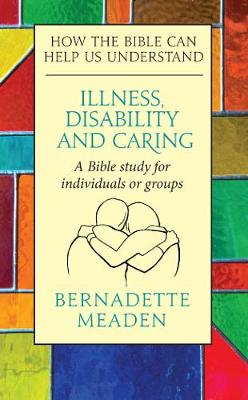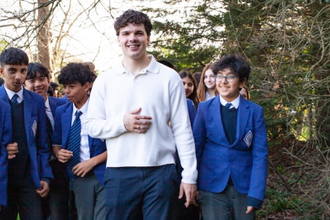Book review: Illness, Disability and Caring

Bernadette Meaden's book, Illness, Disability and Caring is the third in a study series How the Bible Can Help Us Understand, published by Darton Longman and Todd and inspired by the Revised New Jerusalem Bible which was published in July 2019.
The book is short, but the chapter headings indicate its remarkable spiritual and moral range: Radically inclusive love; Made in the image of God; Strength, weakness and the authority of suffering; Suffering; The gift and challenge of caring; Refraining from judgement: logs and splinters. Points for discussion and further action are offered within each section, as are a wide variety of cultural resources across film, art, poetry, dance, drama, music, biography, fiction and documentaries.
The spiritual threads which hold together the book's argument are strong but unobtrusive. Prayers are offered in each section and these are characterised by empathy and loving-kindness, whilst the illustrative scriptural passages are not only well chosen but are woven into something more than a supporting scaffold.
For those of us who are neither biblical scholars nor scriptural literalists, the challenging nature of the 'two-edged sword' may sometimes be difficult. The writer's honesty about her own struggle with some passages puts warm and living flesh on the bones of the book's structure. Her account of journeying with patient attentiveness through the account of Mary and Martha, and what she learned from it during her mother's last illness, is particularly moving. Here is a spirituality which is never didactic nor 'preachy'.
Writing for a programme of study and discussion is not one of a writer's easier tasks. The framework may not be one's own and the necessity of serving both group discussion and individual reflection is not always conducive to the flow of ideas. Meaden has met the challenge with warmth and rigour. Good writing almost always comes out of experience and the author's undramatic description of herself as living with a lifelong disability is worth quoting in full: "I was born with a rare form of complex congenital heart disease, so have experienced some limitations and challenges in my life which I hope helps me to understand some of the issues explored in this book, but of course, every person is unique and every illness and disability affects people differently. Most areas of disability or illness are as unfamiliar to me as they are to anyone else who hasn't experienced them. So I make no claim to expertise on the issues explored in this book, or, indeed, on theology. What follows is very much a personal view, and simply offered as a starting point for thinking and discussion. The hope is that through such discussion, the knowledge and experiences available will be multiplied. Everybody will have something unique to contribute, and thus the discussions will certainly contain far more insight than the book." Knowing both the authority and the limitations of lived experience is the essence of 'authenticity' - a word more often used than reflected upon.
Illness and disability could affect anyone at any time - a possibility which many of us who are generally in good health may choose not to dwell upon. But it is this very unpredictability which should focus our thinking. The COVID-19 crisis has made everyone more vulnerable and some of the injustices and failures of support baked into our social security system and austerity-damaged public services are now having an impact on many for whom they were once distant and unthinkable.
Bernadette Meaden is well known as a writer on the social dimension of disability and long term sickness. It is unsurprising therefore, that she is so effective in exploring the framework of injustice with which those living with physical or mental difficulties have to contend and which too often excludes them from as full a participation as possible in the opportunities, relationships and experiences which make our lives worthwhile and fulfilling.
How government and individuals perceive the unique dignity of every person is the point on which society pivots. Is our centre of gravity to be the Divine economy of generosity or the narrow begrudgery of envy and suspicion? Shall we 'other' and therefore infantilise disabled people? Meaden's vivid realisation of the personality of the man born blind, whose healing is narrated in Chapter 9 of the Gospel of John, reminds us that the Iron Age had its own version of 'does he take sugar?' and that the sterile righteousness of those who prefer tidy orthodoxies over the messiness of love has a long history. Shall we hold in common - both practically and spiritually - the dignity of sick and disabled people and of their carers, as did the early Church, or shall we turn aside to easy excuses and the willed myopia of a protective self-interest?
Meaden cites the scriptural challenge from which no person of good faith may turn away: "For I was hungry and you gave me food, I was thirsty and you gave me drink, I was a stranger and you welcomed me, needing clothes and you clothed me, sick and you visited me, in prison and you came to see me." Then the righteous will say to him in reply, "Lord, when did we see you hungry and feed you, or thirsty and give you drink? When did we see you a stranger and welcome you, needing clothes and we clothed you? When did we see you sick or in prison and go to you?" And the King will answer, "Amen I say to you, in so far as you did this to one of the least of these brothers or sisters of mine, you did it to me."
Whether we are studying individually or collectively, Illness, Disability and Caring offers us the gift of that challenge.
* How the Bible can help us understand: Illness, Disability and Caring is published by Darton, Longman and Todd. It is available to pre-order as an eBook (released 29 May, £4) and as a paperback (released 27 August, £7.99) HERE
© Jill Segger is Associate Director of Ekklesia with particular involvement in editorial issues. She is a freelance writer who contributes to the Church Times, Catholic Herald, Tribune, Reform and The Friend, among other publications. She is the author of Words out of Silence published by Ekklesia in May 2019. Jill is an active Quaker. You can follow her on Twitter at: www.twitter.co/quakerpen


















